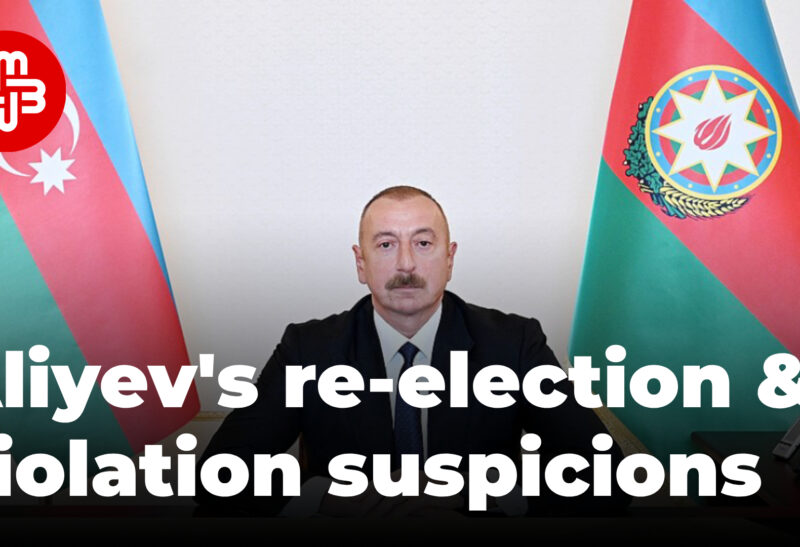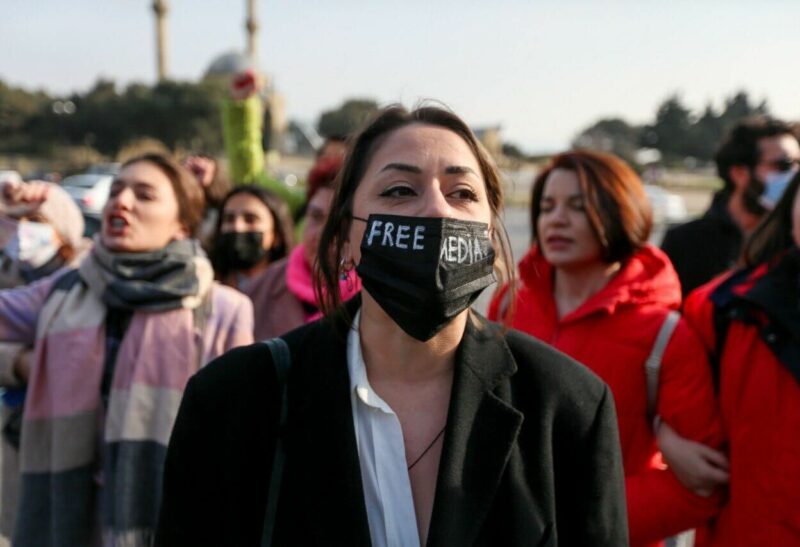
Turkey is a special partner for Azerbaijan: the first to recognize Azerbaijan’s independence, and, what’s more, a member of NATO.
This gives Azerbaijan a serious chance to modernize its military.
For this reason, Baku assigns the utmost importance to cooperation with Turkey in the military sphere. In the 90s, military contacts with Turkey were limited only to assistance in training Azerbaijani military cadres in accordance with the Agreement on Military Education dated 1992.
But since 1994, when Azerbaijan joined the Partnership for Peace program, this cooperation has become more intensive. In 1996, the Azerbaijani-Turkish Agreement on Cooperation in the Fields of Military Technology and Military Training was signed. True, Azerbaijan avoided a close partnership both with NATO and with the Russia-headed Collective Security Treaty Organization. And, it didn’t even officially declare military cooperation with Turkey, careful not to irritate Russia, which plays a significant role in the Karabakh conflict.
But after changes were made in 2010 to the Collective Security Treaty between Russia and Armenia, whose changes established favorable terms for the provisioning of arms and military tech for the Armenian defense forces, and because of dissatisfaction with negotiations over Nagorno-Karabakh, the Agreement on Strategic Partnership and Mutual Support between Azerbaijan and Turkey was concluded in 2010.
Baku viewed Turkey as a channel for strengthening ties with NATO, and within the alliance people embraced the fact that a NATO country was expanding contacts with one of the republics of the former USSR. Turkey and Azerbaijan took on obligations to provide mutual assistance in the case of armed aggression towards one or the other. The agreement also provided for technical rearmament, conducting joint military operations, cooperation in the field of military technology, and joint military exercises and training. And a memorandum between the Ministry of Defense of Azerbaijan and the Turkish arms company Otokar stipulates cooperation in production of infantry weapons and other forms of armaments.
We also shouldn’t discount the fact that Azerbaijan is a country that produces its own drones.

Budget expenditures on defense in Azerbaijan in 2017 were around $1.8 billion, which is 6.9% more than in 2016. On the whole, Azerbaijan’s defense expenditures consist 17.4% of all budget expenditures in 2017. For comparison, Armenia plans to spend $439.7 million on defense in 2017, and Georgia around $309.5 million. True, Turkey is not obliged to automatically get involved in a conflict in the case of aggression directed at Azerbaijan, but it can get involved after “additional consultations”.
All this attests to the fact that both these states are forming a single view on regional problems, but in no way indicates a tendency towards the formation of a single army, something that was mentioned back in 2013 by Zahid Oruj, a member of Azerbaijan’s parliamentary committee on security and defense. He even called for a reimagining of the expression, “One nation, two states” as “One nation, a single army”.
This would displease Russia, not to mention Armenia. Recent evidence of this was the torchlight procession in Yerevan at the end of April, 2017 (connected with the anniversary of the events of 1915 in the Ottoman Empire), during which the state flags of Azerbaijan and Turkey were burned.

Despite close cooperation, it’s unlikely that Baku will permit Turkey to build a military base on its territory, so as not to irritate Russia and Iran by inviting a NATO member state to set up camp on Azerbaijani land. However, Aliyev has stated on more than one occasion that if the Minsk negotiations don’t bring results, then Azerbaijan “has every right to liberate occupied Azerbaijani territories by force”, and it’s unclear what Baku might resort to if it views a new war in Karabakh as inevitable, which is entirely possible if we recall the military operations of April, 2016. Today, economic projects are priorities for Azerbaijan. But the agreement to some degree guarantees aid from Ankara in the instance of an escalation of military activities in Nagorno-Karabakh.
In a certain sense, by maintaining good relations with Baku, Ankara finds itself dependent on Azerbaijan’s interests. Perhaps Turkey would like to gradually move the Karabakh problem into the background and normalize relations with Armenia, trade with whom exceeds $100 million, despite the conflict. But, if Turkey suddenly decides to ignore Azerbaijani interests, then it will lose a support for its Middle East policies and its bridge to the Turkish-speaking countries of Central Asia.
However, nowadays ambiguity can be sensed in Turkey’s own policies, including in the military sphere, which is connected with Ankara’s fairly independent conduct in NATO. Over the course of many decades, Turkey has remained a faithful member of the alliance, made a significant contribution to NATO’s activities, and holds one of the highest rankings in the alliance in terms of number of troops committed.

Turkey is one of five member states in the alliance that has NATO nuclear weapons on its territory, in the form of seventy United States, B61-3/4 type tactical nuclear weapons, stored at the US and NATO air forces’ easternmost base in Europe: Incirlik, in the south of Turkey, not far from the border with Syria.
From ten to twenty of these bombs are designated for use by the Turkish air force. And 142 fighter-bomber squadrons have been formed within the Turkish air force for these purposes. It’s notable that the remaining fifty bombs have been put at the disposal of the US air force, but at the base there are no American warplanes capable of carrying nuclear payloads, since the government of Turkey has said no to the USA in this regard, so as not to allow the base to be fully subordinated to NATO’s command; this is a unique incident for the alliance.
In the case of necessity, Washington would have to specially send planes there. More than sixty various military facilities, airfields, naval bases, and missile launch sites have been built on the territory of Turkey, including the Aegis-system early-warning radar station in the city of Malatya.

But today they believe in NATO that Turkey’s conduct is not that of a reliable partner, though it is following the rules for relations with the alliance. Ankara has invigorated military relations with Russia and China, and is inhibiting the development of military cooperation between NATO and the EU because of the unresolved state of the Cyprus problem, which negatively impacts interrelations between Turkey and Greece, another member of the alliance. The assistance provided to Cyprus by the EU is becoming a serious barrier in Turkey’s entry to the EU. Additionally, Ankara is impeding meetings being held between NATO and representatives of the EU Political and Security Committee, asserting that Cyprus is not a member or a partner of NATO. It would not be out of place to also mention the disagreement over the Syria problem, as a result of which the ex-chairperson of the alliance’s military committee, German General Harald Kujat, even stated that in the fight with ISIS, help from the Turks was “doubtful” from the beginning, and that “Turkey has never been the sort of NATO member that we could rely on 100%”.
Moreover, the West accuses the Turkish regime of repression directed at the plotters who attempted to organize a coup in 2016, of putting pressure on the mass media and of plans to reinstate the death penalty.
And after the recent referendum in Turkey, which expanded the powers of the president, the opinion has taken shape in the EU and NATO that president Erdogan is turning into an “ostentatious, authoritarian leader, whose regime persecutes the political opposition”, that “today, in the Middle East, there remains practically no state that is friendly with Turkey”, and that “after Turkey’s mistakes in Syria, Tehran and Ankara switched places, and when all sorts of threats begin to be directed at Turkey, it will be met with a lock on the gates at the NATO headquarters in Brussels”.
However, Turkey itself has more than a few grievances with its European and American allies. Among other things is the fact that the head of the Incirlik air base, General Bekir Ercan Van, and several high-ranking military officers, among others, were involved in the preparations for the coup. But this is only one drop of the oil poured on the fire.
At the Munich Security Conference, the Minister of Defence of Turkey, Fikri Işik, stated that, “NATO is at present not fulfilling its obligations on the south-eastern flank”, which “must be expanded not only to the east, but also to the south”.
These words reflect the primary reasons for Turkey’s dissatisfaction, which had expected to become NATO’s main partner in the Middle East and strengthen its influence in the region. It is in precisely this context that Turkey viewed the “Arab Spring” in states that had been geopolitical competitors for Ankara. But NATO judged things differently, believing that “even in the geographical sense”, Turkey “is not part of the North Atlantic” and that “Turkey has little in common with other members of NATO.”
But Turkey’s Minister of Foreign Affairs, Ahmet Davutoglu, believes that Turkey’s political weight in NATO has increased, and that its membership in NATO “is not in question, and closer relations with Russia are not a warning to the West”. Ankara’s position is based on the fact that Turkey is the link between NATO and the Arab world, and the Bosphorus makes it the “gate to the Black Sea”. Experts fear that if Ankara ceases to be a member of the North Atlantic Alliance, this will strengthen Russia’s influence. This sort of possibility is voiced, for example, by rumors that Turkey purchased Russian S-400 anti-aircraft missile systems, rather than comparable systems from countries of the Atlantic alliance. The reason for this move was the refusal by German businesses to supply spare parts for Turkish Leopard tanks that Turkey purchased from Germany. After participation in the Syrian conflict, these tanks were in need of repair, which the Germans were required to provide, according to an agreement.
It goes without saying that, despite all these disagreements, the USA and NATO continue to view Turkey as an important partner, in the Middle East first and foremost, and continue to be interested in close cooperation with Ankara. But we’re observing attempts to restrict Turkey’s influence in NATO because of concerns that its policies might lead to a crisis arising in the alliance. This is especially the case since Western politicians understood that Operation Euphrates Shield, which began as a Turkish campaign against ISIL, had transformed into an anti-Kurdish action and had begun turning into a new hotbed of the Syrian war.
It’s clear that all this reflects not only disagreements between Turkey and the West, but also problems of regional politics and global security as a whole.
Turkey is using its NATO membership to put pressure on the EU and doesn’t want to distance itself from the alliance. After all, Turkey’s accession to the European Union has not yet been confirmed, and will most likely be frozen. But, ultimately, the European Union will not have any other option for smoothing out relations with Ankara, who it needs for solving the refugee crisis and for the struggle against radical Islamists. But it’s clear that the entire system of international relations is changing, and taking into account the close cooperation between Azerbaijan and Turkey, the question remains open: what sort of place will Azerbaijan occupy in this system?



